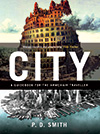Brecht, writing and cigars
08 September 2006 | atomic bomb, Bacon, Bohr, Brecht, cold war, Doomsday Men, Einstein, H-bomb, Hare, Penguin, Turney, Writing & Poetry | Post a comment
I've always loved that photograph of Bertolt Brecht from the 1930s in which he's wearing a worker's flat cap and smoking a thick Cuban cigar. It seems to capture something of his paradoxical personality - Brecht, the bourgeois Bolshevik.
There's a fine production by David Hare currently running at the National of what is for my money Brecht's greatest play. Brecht worked on The Life of Galileo longer than any other play. There are three versions: one completed in 1938, another finished in America just before the atomic bombing of Japan, and a final version from 1955.
Written in exile on the same Danish island where Niels Bohr worked on his doctoral thesis, Brecht's original play highlights the plight of intellectuals - such as those left behind in Nazi Germany - who resist authoritarian regimes in the name of intellectual freedom. But the atomic bomb changed everything for Brecht. "Overnight the biography of the founder of the new physics read differently," he wrote.
What had been a play about science as a discipline with the potential to liberate people from an irrational world-view, was recast into one which illustrates the refusal of scientists to accept their responsibility to humankind and their complicity in the misuse of science. For Brecht, Galileo's recantation before the authority of the Church came to represent the Fall of science. Galileo is no longer a hero but a traitor.
Einstein died on 18 April 1955, two days after the Cologne première of Galileo. In his notes, Brecht identifies Einstein's equation E=mc2 as an example of how the ideal of pure science has become very dangerous in the modern era. Such equations can so easily be turned into the mathematics of mass murder.
Audiences in the cold war would have instantly seen that Brecht's Galileo was not just a history play, but about politics and the purpose of science. Brecht tipped his worker's cap to Francis Bacon when he wrote that science should be about relieving the drudgery of human existence. What is the point of the discoveries of Galileo and his fellow physicists (he asks) if all they ultimately lead to is bigger and better bombs? One day, predicts an older and wiser Galileo, the scientists' yells of Eureka! will be greeted by a universal cry of horror because of the ever more terrible superweapons their discoveries make possible.
David Hare's production is excellent (apart from the pseudo-Cabaret carnival scene, about which the less said the better). Simon Russell Beale's performance in the title role is superb and captures perfectly the passion for life and science that is central to Brecht's Galileo. But the contemporary relevance of Brecht's scientific message at a time of renewed fears about weapons of mass destruction seems absent from Hare's version, which is a missed opportunity. Although to my eyes, the stage set evoked the skeletal remains of the Hiroshima Atomic Bomb Dome, a haunting reminder of the deadly power of the laws of physics. Or was it just meant to represent an observatory?
I spent the evening at the National with my editor, Jon Turney,and his family. The editing on Doomsday Men is complete, well almost. Less is more, was Jon's rationale and I kept repeating it to myself like a mantra as I decided whether to accept or decline his deletions. Being edited is a bit like going to the dentist. It's painful but you know it's for the best. And thanks to Jon, the final text is much improved. When you live and breathe a book project for years, it's difficult to find the distance necessary to see where a few more words are needed or some can be cut. That's why a good editor is so important. It's a lesson some publishers have forgotten. Fortunately Penguin is not one of them.
So now, after three years of researching the life and times of the Doomsday Men, I've returned my last library book (at one point I had fifty on loan) and checked the final endnote reference (there are over a thousand). It's at moments like these that you feel like putting your feet up and lighting a Brechtian cigar...
[originally on MySpace]

